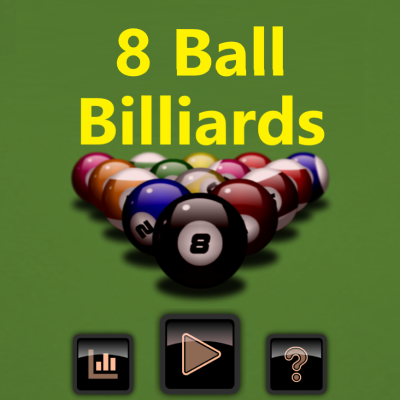
8 Ball Billiards is an online billiards game that simulates real matches. Your task is to calculate and come up with smart strategies to defeat your opponents.
8 Ball Billiards is an attractive and popular billiard game worldwide. The game has specific rules and attracts a large number of players around the world. The player's goal is to try to get all of his groups into the hole and then put the extremely prominent black ball number 8 into the hole to win. This billiards game is becoming more and more popular and attracting millions of online players around the world. The game is suitable for all ages; whether you are a student, a working person, or an elderly person, you can play it as a way to relax your mind.
The first thing to play well in the 8 Ball Billiards game is that players need to understand the basic rules of the game. Players need to follow the clear order from the opening shot to the end of the last shot.
Your goal in this game is to be the first to pocket all the balls in your group before your opponent, then try to pocket the last 8 ball to win the match. The balls will be divided into groups of balls from 1-7 as solid balls and from 9-15 as striped balls so that players can easily identify and distinguish their groups of balls as well as those of their opponents.
When the game starts, the table will be in an open state, meaning that no player has been assigned a ball group. The first player to legally pocket the ball will be assigned a group of balls, which can be stripes or solids, depending on which ball is pocketed when the opening ball is broken. For example, if you sink the 3 ball, you will be assigned the "solid" ball group. Your opponent will automatically be assigned to the remaining pool.
A game of 8 Ball Billiards starts with a break shot. A legal break requires the player to either:
Failing to meet one of these conditions results in a foul. If the cue ball is pocketed on the break, it is also a foul. In most online versions, a foul on the break gives the opponent "ball-in-hand," allowing them to place the cue ball anywhere on the table for their first shot.

To be able to score many successful goals, you need to master the following rules and rules to avoid making unnecessary small mistakes. Especially for new players, it is essential to understand that, regardless of your skill level, if you do not comprehend the game's rules, you will still be penalized and may ultimately lead to a loss. Here are some rules about the 8-ball that you need to master:
You need to know how to control the force of hitting the cue ball to get the ball into the pocket accurately. You should calculate and predict the next steps in advance to have the most accurate path. When hitting the cue ball, you also need to pay attention to both the speed and the point of contact to predict the path after contact.
The force of hitting the ball can be strong but still within control. A strong force is often used when breaking the ball or when you need to move many balls. Learn how to adjust and control the cue ball so that it does not bounce after hitting the object ball. When shooting the target ball near the pocket, you should hit gently to have high accuracy.
The game has no time limit, so you have time to think and calculate the shots 2 or 3 times in advance will be best. You need to visualize the path of the cue ball after each shot so that it can set up for the next shot.
Playing billiards also requires a defensive strategy. When you cannot make a reasonable shot, or when your opponent is in a favorable position, consider playing safe. You can do this in the following ways:
Or you can make a mistake for your opponent. This is a pretty smart strategy to force your opponent to make a mistake and give you the cue ball in hand. This is a strategy that gives you the biggest advantage in billiards.
The table is opened immediately after the break. The pool is determined as solid or striped by which ball the player pockets first. If both solid and striped balls are pocketed on the open shot, the player is allowed to choose his pool.
This is a foul. You must touch a ball from your pool first. Only when the game is open and a break is needed to determine the pool can you touch any object ball, except the black 8 ball.
This is a foul. Your pocketed object ball remains pocketed, but in this case, your opponent has the right to re-pocket the cue ball in any position they wish.
Your ball is pocketed legally, and you continue your shot. The opponent's ball that is pocketed will remain pocketed. This is not a foul, as long as the cue ball made contact with your ball first and there is no other foul, it is still valid.
If you pocket your opponent's ball on the first contact, you lose your shot, and the shot is given to your opponent. Your opponent also has the added privilege of placing the cue ball wherever they want. If you pocket your ball first, but then accidentally pocket your opponent's ball, it is not a foul.